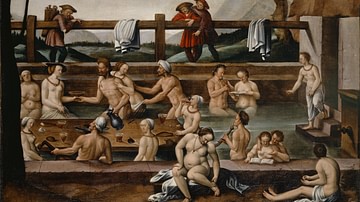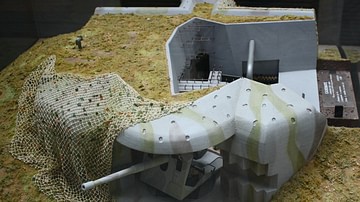Search Images
Browse Content (p. 130)

Image
Logistics, Omaha Beach
A photograph showing the follow-up landing of men and material of the U.S. Army on Omaha Beach during the Normandy Landings which began on D-Day 6 June 1944. (Imperial War Musuems)

Image
Aerial View, Omaha Beach
An aerial photograph showing the landing craft and barrage balloons which comprised the attack by the U.S. Army on Omaha Beach during the Normandy Landings which began on D-Day 6 June 1944. (Imperial War Musuems)

Image
Destroyed Vehicles, Omaha Beach
A photograph showing destroyed vehicles of the U.S. Army on Omaha Beach during the Normandy Landings which began on D-Day 6 June 1944. (Imperial War Musuems)

Image
Hare Indian Dog
Hare Indian Dog, hand-colored lithograph by John Woodhouse Audubon, 1848.
Buffalo Bill Center of the West, Wyoming.

Image
Aerial View, Gold Beach
An aerial view of Gold Beach during the D-Day Normandy Landings of 6 June 1944. The smoke is from German defensive positions struck by Allied naval and air bombardment. (Imperial War Museums)

Image
The Bath at Leuk
The Bath at Leuk, oil on canvas by Hans Bock the Elder, c. 1597.
Kunstmuseum Basel

Image
Bodies in the Middle Ages Exhibition
Bodies in the Middle Ages exhibition in the Schweizerisches Nationalmuseum, Zürich.

Image
Bodies in the Middle Ages in Zürich
Bodies in the Middle Ages, exhibition in Schweizerisches Nationalmuseum, Zürich.

Image
Casemate Model, Gold Beach
A model of a 150-mm gun casement located at Longues-sur-mer on Gold Beach of the D-Day Normandy landings of 6 June 1944. (The Mémorial de Caen)

Image
German Bunker, Gold Beach
A captured German bunker with 50-mm gun at Gold Beach, attacked during the D-Day Normandy landings of 6 June 1944. (Imperial War Museums)